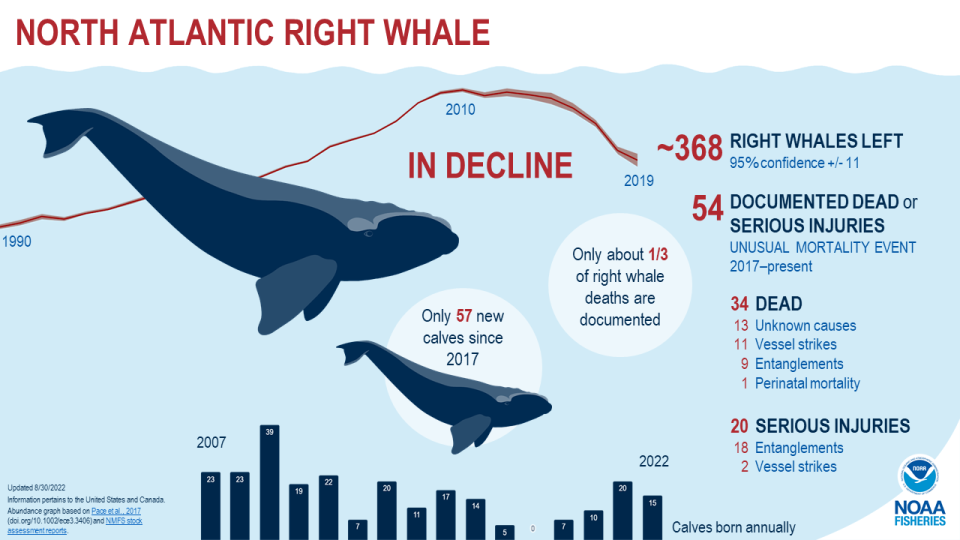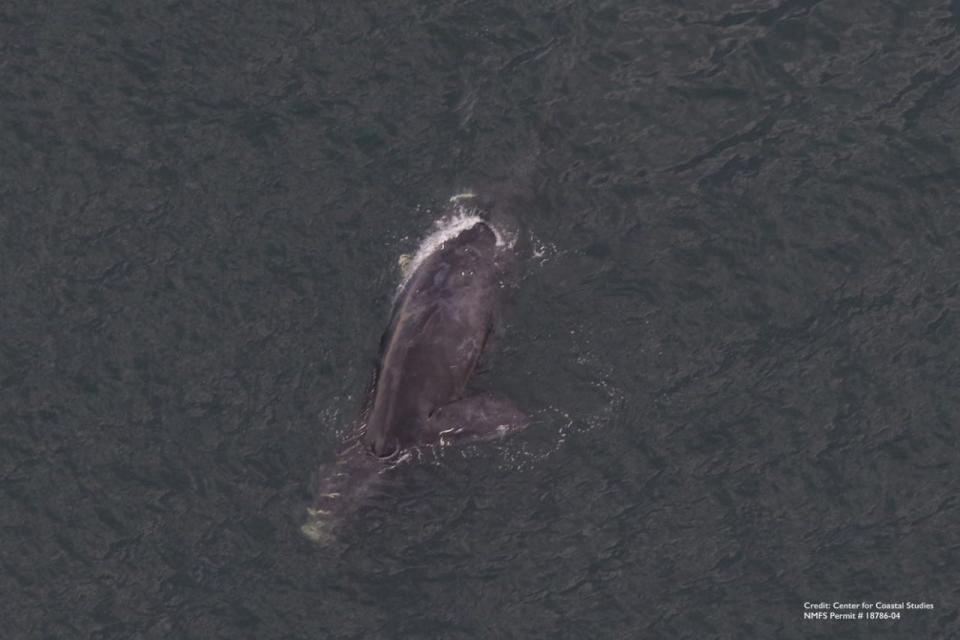Boat 10-knot speed limit? NOAA says it saves right whales, critics say it kills industry
A proposed stricter speed limit to protect the critically endangered North Atlantic right whale is finding opposition from boaters who say it will cripple the recreational boating and fishing industry while providing little protection to right whales.
The new vessel strike reduction rule, which is in the National Oceanic and Atmospheric Administration's public comment period that ends Oct. 31, would include smaller 35- to 65-foot vessels and stretch from the coast out to 100 miles in some areas. The zones cover almost the entire length of the Atlantic seaboard, from Massachusetts to Florida.
After Oct. 31, NOAA will then consider drafting the measure, which could go into effect next year.
Previously these smaller boats were exempt from the speed rules, first established in 2008, and the zones were kept to 10 seasonal management areas on the coast, primarily near ports where boat traffic is heaviest.
Boats would be restricted to 10-knot speeds in the new zones from Nov. 1 to to May 30. That is when the whales are know to migrate from their summer foraging grounds in the Gulf of Maine to their winter calving grounds in the South Atlantic Bight, from North Carolina to Florida. That is the only known calving place for the whales, NOAA reports.
While party boats, the large 65- to 125-foot vessels that carry crowds of people, typically travel between 10 to 20 knots, charter and private sport boats can hit top speeds of 60 knots.
'Why do we need this?'Fishermen fear Hudson Canyon sanctuary will mean more restrictions
"This is probably the biggest maritime regulation ever proposed on the recreational boating industry. It impacts the most number of boats, the most number of states and the most number of fisheries. It's a big issue for us," said John Depersenaire, director of government affairs and sustainability for Viking Yachts, which builds boats between 33 and 90 feet.
Depersenaire said the industry did not have any input on the drafting of the rule. He said New Jersey has several active fisheries in the late fall, winter and spring that will be impacted by the speed rules if adopted.
Desperenaire said the boats operate more effectively and are more fuel-efficient when they're planing, which happens when the boats hit about 15 knots. Planing makes use of hydrodynamic lift.
The for-hire fleet also operates on a time schedule and 10-knot speeds would limit where they could fish in a day, Desperenaire said.
Violators of the current speed laws are subject to substantial monetary fines, sometimes exceeding $50,000. NOAA uses electronic tracking, such as the Automatic Identification System, or AIS, to calculate and chart a vessel's speed over its entire route.

NOAA said the North Atlantic right whale's situation is dire. There is believed to be fewer than 350 North Atlantic right whales left, out of which just 100 are adult females capable of reproducing. The whales were depleted by the commercial whaling and, despite protection from commercial harvest since 1935, have not recovered.
Following two decades of growth between 1990 and 2010, the species has since been in decline due to a combination of increased human-caused mortality and decreased reproductive output. NOAA said right whale mortality is exceeding its birth rate.
Vessels less than 65 feet in length have accounted for five of the 12 documented lethal strikes to right whales in U.S. waters since 2008, when speed restrictions were first put in place. One of the incidents was off Long Branch in June 2020, when the carcass of a male calf was spotted floating with several propeller wounds.

Long Branch:Endangered whale, one of 400 left, found dead
"The rule is definitely going to cause some hardship for people because they're going to have to slow down," said Bob Schoelkopf, director, Marine Mammal Stranding Center, in Brigantine.
He said the center has responded to a couple of stranded right whales in its 40-plus years of operation. One was in 1983 at Island Beach State Park, where a calf washed ashore dead after its tail was severed by a ship strike.
Jersey Shore wild sealife encounters: 'What else are we going to see?'
The boating industry is calling for NOAA to pause on the rule and redesign it so it lessens the potential impact on the recreational industry.
A coalition of trade groups representing the industry complied an analysis of National Marine Fisheries Service data, the fisheries arm of NOAA, and that found approximately 5.1 million recreational fishing trips were taken in the proposed zones by vessels 35 to 65 feet in length since 2008. Assuming all five right whale strikes during that time were from recreational vessels, and that all these vessels were on fishing trips, the chance of a 35- to 65-foot recreational vessel striking a right whale during a fishing trip is less than one-in-a-million, the group argued.
Whale sightings in NJ:7 amazing encounters at the Jersey Shore
“NOAA’s proposed rule unfortunately underestimates the very real economic impacts on the recreational boating and fishing industry, the largest contributor to the nation’s $689 billion outdoor recreation economy. The rule will bring the vast majority of boating and fishing trips along the Atlantic Coast to a screeching halt, impacting millions of Americans who go boating each year,” said Frank Hugelmeyer, president of the National Marine Manufacturers Association.
When Jersey Shore native Dan Radel is not reporting the news, you can find him in a college classroom where he is a history professor. Reach him @danielradelapp; 732-643-4072; dradel@gannettnj.com.
This article originally appeared on Asbury Park Press: Boating speed limits proposed by NOAA panned by mariners

